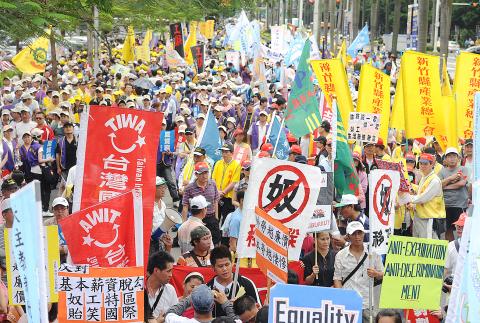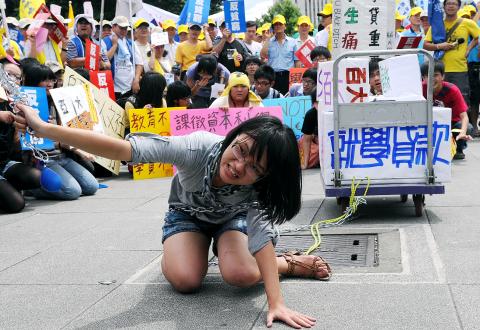More than 1,000 labor union members, activists, medical interns, nurses, migrant workers, teachers and students expressed their dissatisfaction with working conditions and the employment environment in a protest in Taipei on Workers’ Day yesterday.
Holding flags and signs outlining their demands, workers from various industries gathered at Liberty Square at noon to protest against poverty and worker exploitation.
Among a series of demands, groups called for the abolition of the responsibility system in the Labor Standards Act (勞動基準法), a reduction in the number of temporary workers and measures to protect young people’s right to work.

Photo: Liao Chen-huei, Taipei Times
Leading the parade, more than 200 nurses shouted: “We refuse to allow patients to take care of patients” and “patients can only be healthy when nurses get enough rest.”
Taiwan Radical Nurses Union member Liang Hsiu-mei (梁秀眉) said that in addition to protesting against insufficient manpower and rest hours, this year the union is emphasizing the serious problem of “freakish shift arrangements” — the unreasonable and frequent shift changes with only a few hours of rest in between, leading to exhaustion and sleep disorders.
Other protesters looked to future generations.

Photo: AFP
“We are standing out here not just for our generation, but also for our children. Many of our members’ children face difficulties in finding a stable job and often end up relying on their parents’ income,” said Yang Chun-hua (楊俊華), chief secretary of the Labor Union of the Taipei City Government’s Department of Environmental Protection.
Yang said about 20 percent of union members’ children were on student loans and about one-third of the members were still paying back credit card debt with their salary.
South Taiwan Passenger Transportation Ltd Liability Co Trade Union chairperson Chen Yun-hsiang (陳韻翔) said bus drivers were often forced to work excessive hours under poor health conditions, endangering the lives of passengers.
Holding signs that read “equality” and “minimum wage covers all workers,” foreign workers called for the same wage as local workers.
On Ketagalan Boulevard in the morning, hundreds of labor rights activists from about 30 civic groups held a protest against deteriorating labor conditions by performing sports competitions that symbolized exploitation or economic burdens faced by workers.
The “events” — a race to show that workers cannot catch up financially, weightlifting to represent the heavy economic burden on families and a pole-jumping competition to symbolize rising consumer and energy prices — highlighted the reality that the losers in the system are “guaranteed an unfair game,” said the Taiwan Labor Front, which organized the event.
Taiwan Labor Front secretary-general Son Yu-lian (孫友聯) said about one-fourth of salaried workers are unable to save more than NT$50,000 (US$1,714) a year and the majority barely make a living with their low wages.
A generation of breakdown and collapse is being created, Son said.
“Why is it that we workers only earn about 44 percent of the total income, but have to pay about 75 percent of the total income tax in Taiwan?” Alliance for Fair Tax Reform convener Wang Jung-chang (王榮璋) said, adding that the government was lying to the public with its promises of imposing a tax on the rich.
“The Executive Yuan recently announced it would raise the stock income tax threshold from NT$3 million, as initially proposed, to NT$4 million, but the income tax deduction for workers is only about NT$104,000,” Wang said.
Near the end of the rally, the activists pasted pieces of paper that read “poverty,” “exhaustion,” “blind,” “debt” and other characters on a large board decorated with a printout of President Ma Ying-jeou’s (馬英九) Facebook page.

CHAOS: Iranians took to the streets playing celebratory music after reports of Khamenei’s death on Saturday, while mourners also gathered in Tehran yesterday Iranian Supreme Leader Ayatollah Ali Khamenei was killed in a major attack on Iran launched by Israel and the US, throwing the future of the Islamic republic into doubt and raising the risk of regional instability. Iranian state television and the state-run IRNA news agency announced the 86-year-old’s death early yesterday. US President Donald Trump said it gave Iranians their “greatest chance” to “take back” their country. The announcements came after a joint US and Israeli aerial bombardment that targeted Iranian military and governmental sites. Trump said the “heavy and pinpoint bombing” would continue through the week or as long

TRUST: The KMT said it respected the US’ timing and considerations, and hoped it would continue to honor its commitments to helping Taiwan bolster its defenses and deterrence US President Donald Trump is delaying a multibillion-dollar arms sale to Taiwan to ensure his visit to Beijing is successful, a New York Times report said. The weapons sales package has stalled in the US Department of State, the report said, citing US officials it did not identify. The White House has told agencies not to push forward ahead of Trump’s meeting with Chinese President Xi Jinping (習近平), it said. The two last month held a phone call to discuss trade and geopolitical flashpoints ahead of the summit. Xi raised the Taiwan issue and urged the US to handle arms sales to

State-run CPC Corp, Taiwan (CPC, 台灣中油) yesterday said that it had confirmed on Saturday night with its liquefied natural gas (LNG) and crude oil suppliers that shipments are proceeding as scheduled and that domestic supplies remain unaffected. The CPC yesterday announced the gasoline and diesel prices will rise by NT$0.2 and NT$0.4 per liter, respectively, starting Monday, citing Middle East tensions and blizzards in the eastern United States. CPC also iterated it has been reducing the proportion of crude oil imports from the Middle East and diversifying its supply sources in the past few years in response to geopolitical risks, expanding

Pro-democracy media tycoon Jimmy Lai’s (黎智英) fraud conviction and prison sentence were yesterday overturned by a Hong Kong court, in a surprise legal decision that comes soon after Lai was jailed for 20 years on a separate national security charge. Judges Jeremy Poon (潘兆初), Anthea Pang (彭寶琴) and Derek Pang (彭偉昌) said in the judgement that they allowed the appeal from Lai, and another defendant in the case, to proceed, as a lower court judge had “erred.” “The Court of Appeal gave them leave to appeal against their conviction, allowed their appeals, quashed the convictions and set aside the sentences,” the judges